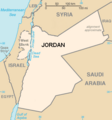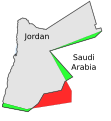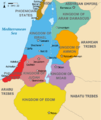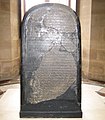
Back بوابة:الأردن Arabic دەروازە:ئوردن CKB Portail:Jordanie French Պորտալ:Հորդանան Armenian Portal:Jordan Malay Portal:Jordânia Portuguese Портал:Иордания Russian باب:اردن Urdu
The Jordan Portal  Jordan, officially the Hashemite Kingdom of Jordan, is a country in the Southern Levant region of West Asia. Jordan is bordered by Syria to the north, Iraq to the east, Saudi Arabia to the south, and Israel and the occupied Palestinian West Bank to the west. The Jordan River, flowing into the Dead Sea, is located along the country's western border. Jordan has a small coastline along the Red Sea in its southwest, separated by the Gulf of Aqaba from Egypt. Amman is Jordan's capital and largest city, as well as the most populous city in the Levant. Modern-day Jordan has been inhabited by humans since the Paleolithic period. Three kingdoms emerged in Transjordan at the end of the Bronze Age: Ammon, Moab and Edom. In the third century BC, the Arab Nabataeans established their kingdom centered in Petra. Later rulers of the Transjordan region include the Assyrian, Babylonian, Roman, Byzantine, Rashidun, Umayyad, Abbasid, and the Ottoman empires. After the Great Arab Revolt against the Ottomans in 1916 during World War I, the Greater Syria region was partitioned by Britain and France. The Emirate of Transjordan was established in 1921 by the Hashemite, then Emir, Abdullah I, and the emirate became a British protectorate. In 1946, Jordan gained independence and became officially known as the Hashemite Kingdom of Jordan. The country captured and annexed the West Bank during the 1948 Arab–Israeli War until it was occupied by Israel in 1967. Jordan renounced its claim to the territory to the Palestinians in 1988, and signed a peace treaty with Israel in 1994. Jordan is a semi-arid country, covering an area of 89,342 km2 (34,495 sq mi), with a population of 11.5 million, making it the eleventh-most populous Arab country. The dominant majority, or around 95% of the country's population, is Sunni Muslim, with the rest being mostly Arab Christian. Jordan was mostly unscathed by the violence that swept the region following the Arab Spring in 2010. From as early as 1948, Jordan has accepted refugees from multiple neighbouring countries in conflict. An estimated 2.1 million Palestinian refugees, most of whom hold Jordanian citizenship, as well as 1.4 million Syrian refugees, were residing in Jordan as of 2015. The kingdom is also a refuge for thousands of Christian Iraqis fleeing persecution. While Jordan continues to accept refugees, the large Syrian influx during the 2010s has placed substantial strain on national resources and infrastructure. The sovereign state is a constitutional monarchy, but the king holds wide executive and legislative powers. Jordan is a founding member of the Arab League and the Organisation of Islamic Co-operation. The country has a high Human Development Index, ranking 99th, and is considered a lower middle income economy. The Jordanian economy, one of the smallest economies in the region, is attractive to foreign investors based upon a skilled workforce. The country is a major tourist destination, also attracting medical tourism due to its well developed health sector. Nonetheless, a lack of natural resources, large flow of refugees, and regional turmoil have hampered economic growth. (Full article...) Selected article -
The Dana Biosphere Reserve (Arabic: محمية ضانا للمحيط الحيوي) is Jordan's largest nature reserve, located in south-central Jordan. Dana Biosphere Reserve was founded in 1989 in the area in and around the Dana village and Wadi Dana comprising 308 square kilometres (119 sq mi). (Full article...)
Selected biography -
Abdullah El Tell (Arabic: عبدالله التل, 17 July 1918 – 1973) served in the Transjordanian Arab Legion during the 1948 war in Palestine rising from the rank of company commander to become Military Governor of the Old City of Jerusalem. He was later accused of being involved in the assassination of King Abdullah I−which he denied−and spent many years in Egypt before returning to Jordan in 1967. (Full article...)
WikiProjectFor editor resources and to collaborate with other editors on improving Wikipedia's Jordan-related articles, see WikiProject Jordan. General images -The following are images from various Jordan-related articles on Wikipedia.
Selected city -
Al Husun (Arabic: الحصن, also Romanized as Al Husn, Hisn and Husn) is a town in northern Jordan, located 65 km (40 mi) north of Amman, and about 7 km (4 mi) south of Irbid. It has a population of 35,085. The region has fertile soil which along with the moderate climate allows the growing of high quality crops. Al Husn was known for its wine; now its main products are wheat and olive oil. Al Husn is registered in Jordanian government documents with the spelling 'Al Husun', and it is the administrative center of the Bani Obaid district. (Full article...)
See also: List of cities in Jordan
Related portalsReligions in Jordan Arab states Other countries Recognized content
Featured articlesGood articles
TopicsSelected topic overview -
CategoriesSelected picture - Credit: Daniel Case Wadi Rum's resemblance to the surface of Mars has made it a popular filming and tourist attraction
Associated WikimediaThe following Wikimedia Foundation sister projects provide more on this subject:
SourcesDiscover Wikipedia using portals |
© MMXXIII Rich X Search. We shall prevail. All rights reserved. Rich X Search

































































